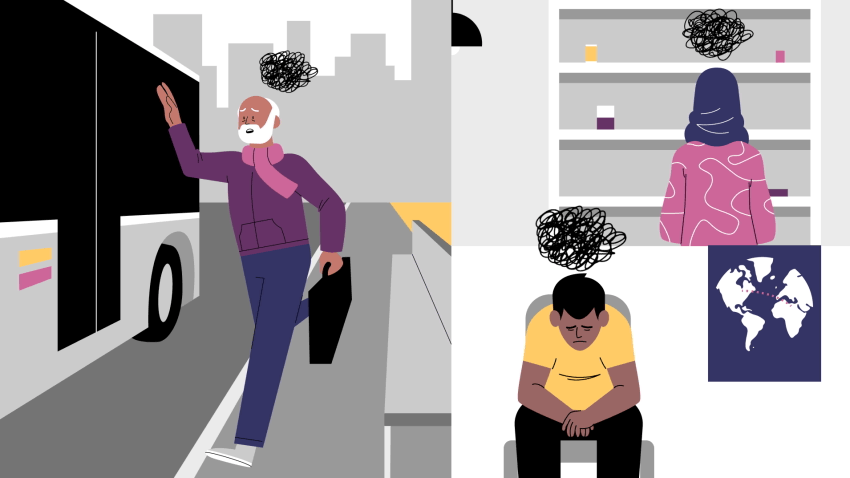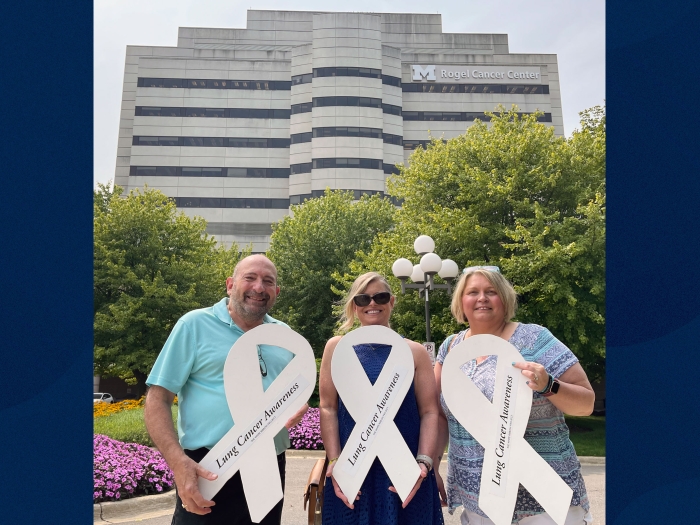Multiple factors, ranging from fear of deportation to food insecurity, create a negative domino effect for the health of the MENA community.
11:10 AM
Author |

Within southeast Michigan's Middle Eastern and North African community, those who worry about deportation or believe they've been treated unfairly are likely to face more adverse conditions associated with poor health, including food insecurity and financial distress.
The MENA people who face several of these barriers are also more likely to report chronic illness and mental health issues as well as worse overall health.
That's according to a new study by the University of Michigan Rogel Cancer Center, the University of Michigan School of Public Health, and the Arab Community Center for Economic and Social Services.
"There are numerous health disparities for the MENA community that are not that different from other racial and ethnic groups where we're trying to close the gap," says Minal R. Patel, Ph.D., M.P.H., an associate professor of health behavior and health education at the U-M School of Public Health and a member of the Rogel Cancer Center. "The data show us that this is an important population where we should be focusing our efforts to address health needs."
How immigrant status affects your health
This is the latest in a series of papers based on data from an extensive survey designed to better understand the population within one of the geographic areas the Rogel Cancer Center aims to serve. The researchers paid special attention to MENA people because metro Detroit is home to one of the United States' largest MENA communities, with about 210,000 residents hailing from Lebanon, Egypt, Syria, Iraq, Yemen and other Arab countries.
MORE FROM THE LAB: Subscribe to our weekly newsletter
Previous state surveys had revealed significant health disparities for the MENA population, similar to what Michigan's African-American and Hispanic groups experience. However, Patel and her research team knew more specific data was needed to determine MENA people's unmet health needs as well as the impact that discrimination has on their health.
Through questionnaires distributed in community venues — including grocery stores, mosques, and health care clinics — to about 400 people who identified as MENA, researchers found that almost 60% of respondents felt they had experienced discrimination. Close to half did not believe the government was trying to improve life for Arab-Americans. Although fewer people worried about deportation or thought they had been treated unfairly, those who did often faced more adverse conditions associated with poor health, such as food insecurity.
We were able to highlight that even though we don't share a border with a Middle Eastern country, we still have a sizeable population right next door to us that has concerns about immigration.
More unmet health needs were also found among people who were not born in the United States (58% of the study's sample); who had lived in America for fewer years; who spoke Arabic at home; and who were from Egypt, Syria, or Yemen — countries with unstable political environments and high poverty rates.
Public health researchers and media outlets alike have previously called attention to the physical and mental toll of immigration-related concerns on Latino immigrants. Patel says this data illustrates how the MENA people fit into that discussion.
"We were able to highlight that even though we don't share a border with a Middle Eastern country, we still have a sizeable population right next door to us that have concerns about immigration," Patel says. "This is another community where we can bring in that national conversation and think about how it is specifically impacting health."
Barriers to optimal health
Among risk factors that limit optimal health in the MENA population, transportation issues for health care visits, food insecurity, and financial strain were the most common, followed by unemployment and unstable housing.
Patel said she was surprised at the prevalence of food insecurity in particular given the number of grocery stores and restaurants in areas with large concentrations of the MENA population.
"When you drive through Dearborn, where much of the survey took place, it doesn't look like the makeup of your typical food desert," Patel says. "So we need to unpack that. Food insecurity is multidimensional, and the availability of food is only one component."
Like Podcasts? Add the Michigan Medicine News Break on iTunes, Google Podcast or anywhere you listen to podcasts.
Overall, experiencing more risk factors for poor health, e.g., food insecurity and unemployment and unstable housing, was linked with more chronic diseases, including cancer, diabetes, high blood pressure, depression and heart conditions. In addition, mental health and general health were poorer for the people who faced multiple societal conditions that limit optimal health.
This survey was conducted in 2019, and Patel says all the issues discussed have likely worsened for the MENA community since then due to the increased stressors of the pandemic.
Paper cited: "A Snapshot of Social Risk Factors and Associations with Health Outcomes in a Community Sample of Middle Eastern and North African (MENA) People in the U.S," Journal of Immigrant and Minority Health. DOI: 10.1007/s10903-021-01176-w

Explore a variety of health care news & stories by visiting the Health Lab home page for more articles.

Department of Communication at Michigan Medicine
Want top health & research news weekly? Sign up for Health Lab’s newsletters today!





